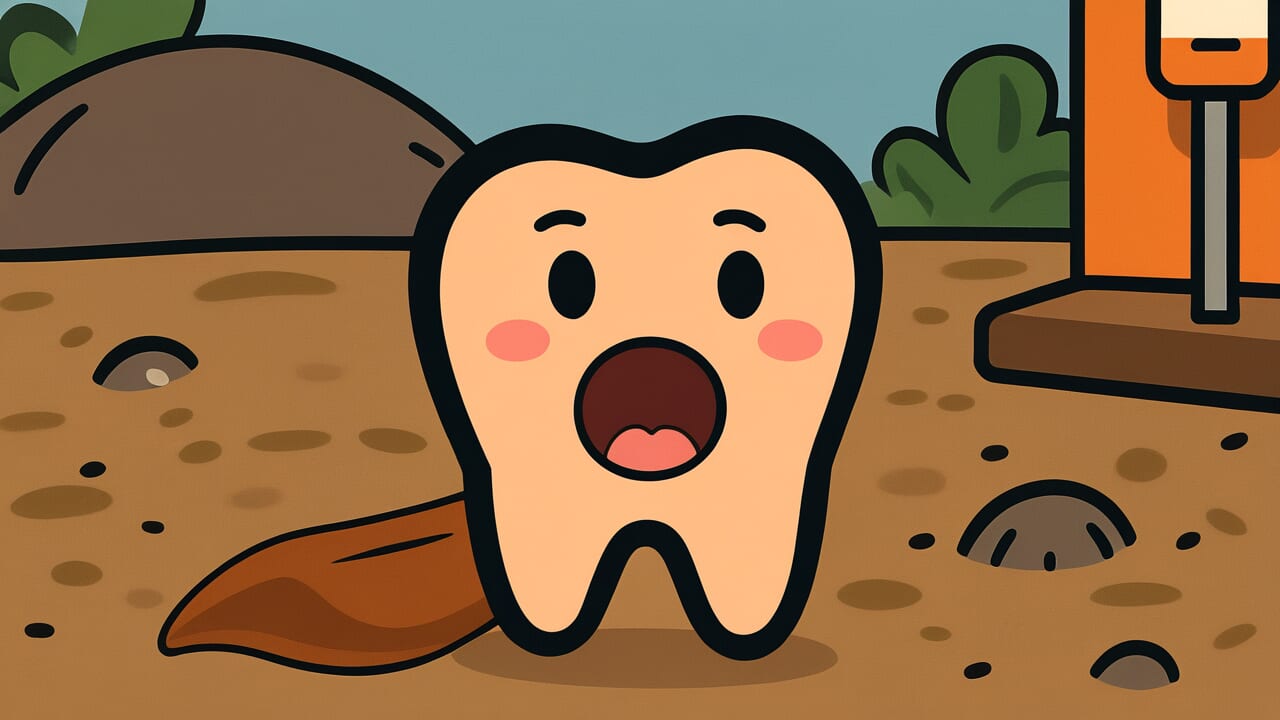How to Read “Teeth perish, tongue remains”
Ha horobi shita sonsu
Meaning of “Teeth perish, tongue remains”
This proverb means that flexible things last longer than hard things. Hard and stubborn things may look strong at first glance.
But they are actually fragile against outside forces and changes. They break or snap easily. On the other hand, soft and adaptable things can change their form according to the situation and survive for a long time.
People use this proverb when talking about how to live or handle situations. It teaches us the importance of responding flexibly to circumstances rather than stubbornly sticking to our own ideas.
Even in modern society, in times of rapid change, we need an attitude of flexible adaptation. This is better than clinging to rigid thinking or methods.
Strength is not necessarily hardness. True strength lies in flexibility. This saying contains a deep insight.
Origin and Etymology
This proverb is thought to come from teachings recorded in the ancient Chinese text “Laozi.” Laozi was a philosopher from around the 6th century BCE. He is known for teaching the value of flexibility and humility.
In “Laozi,” there is a passage that says “the tongue remains because it is soft, and teeth are lost first because they are hard.” This teaching came to Japan and became the concise expression “Teeth perish, tongue remains.”
Laozi believed that things that are soft like water and can change form according to the situation are actually the strongest.
When you observe the human body, hard teeth chip or fall out with age. But the soft tongue maintains its function throughout life.
This familiar fact came to be used as a metaphor for how to live in the world. Hard and stubborn things break easily against outside forces. Flexible and adaptable things survive longer.
This teaching is one of the fundamental ideas of Eastern philosophy. This proverb expresses such deep philosophy through a body metaphor that anyone can understand. It is a crystallization of ancestral wisdom.
Usage Examples
- That company has changed its business to match the times, so it’s truly “Teeth perish, tongue remains” – they’re still thriving today
- He was stubborn and inflexible, but as he got older, he seems to understand the meaning of “Teeth perish, tongue remains” – lately he’s started listening to other people’s opinions
Universal Wisdom
Everyone wants to be strong. We want to be someone who doesn’t lose to difficulties, someone who sticks to their beliefs. But “Teeth perish, tongue remains” teaches us a different form of strength. That is the strength of flexibility.
Hard things break easily. This is true not just as a physical law, but in life too. People who cling too much to their own ideas can’t keep up with environmental changes and become isolated.
Organizations that stubbornly maintain old methods get left behind by the times. Things that seem solid and unshakeable are actually the most fragile.
Why do humans have this nature? It’s because we fear change. Changing what we’ve believed to be right feels scary, like denying our past.
But what we need to survive is the courage to overcome that fear.
This proverb has been passed down for thousands of years because humans have always faced this conflict. The comfort of staying the same versus the necessity of changing.
While swaying between these two, our ancestors realized that “being flexible” is true strength. This is a truth of life that hasn’t changed even today.
When AI Hears This
The different fates of teeth and tongue brilliantly demonstrate a fundamental dilemma that materials engineering has struggled with for years. It’s the seemingly contradictory phenomenon that harder materials break more easily.
When you increase a material’s hardness, the bonds between atoms become strongly fixed. Tooth enamel has a Mohs hardness of 7, harder than iron.
But this hardness means there’s no room to absorb impact energy. When force is applied, the material can’t release energy by deforming and shifting atomic arrangements. So when a certain threshold is exceeded, it breaks all at once.
This is why a diamond shatters into pieces when you hit it with a hammer.
On the other hand, flexible tissue like the tongue disperses energy by deforming its structure when receiving external force. Rubber doesn’t break even after being bent tens of thousands of times because its molecular chains can move while intertwined.
This “toughness” is the key to long-term survival.
What’s interesting is that this principle also applies to organizational management. Organizations bound by strict rules are efficient but fragile against unexpected crises.
During the 2008 financial crisis, rigid large corporations collapsed one after another. Meanwhile, companies that could flexibly change direction survived. The contrast between teeth and tongue teaches us the importance of “strength through deformation” – a durability in a different dimension from strength.
Lessons for Today
In our rapidly changing modern society, this proverb teaches us something important. It’s the value of being flexible while holding onto your beliefs.
When someone suggests a new method at work, do you immediately reject it saying “the old way is good enough”? When opinions clash in relationships, do you become desperate only to assert your correctness?
That might be living like hard teeth.
Being flexible doesn’t mean abandoning your beliefs. Rather, it’s having the courage to change form in order to protect what’s truly important.
Like the tongue, you change how you move according to the situation, but you don’t lose your essential function. If you can live that way, you can overcome any difficulty.
Starting today, try being a little more conscious. Listen to other people’s opinions. Try new things. Reconsider your own thoughts.
That small flexibility will become the strength that supports you for a long time.



Comments